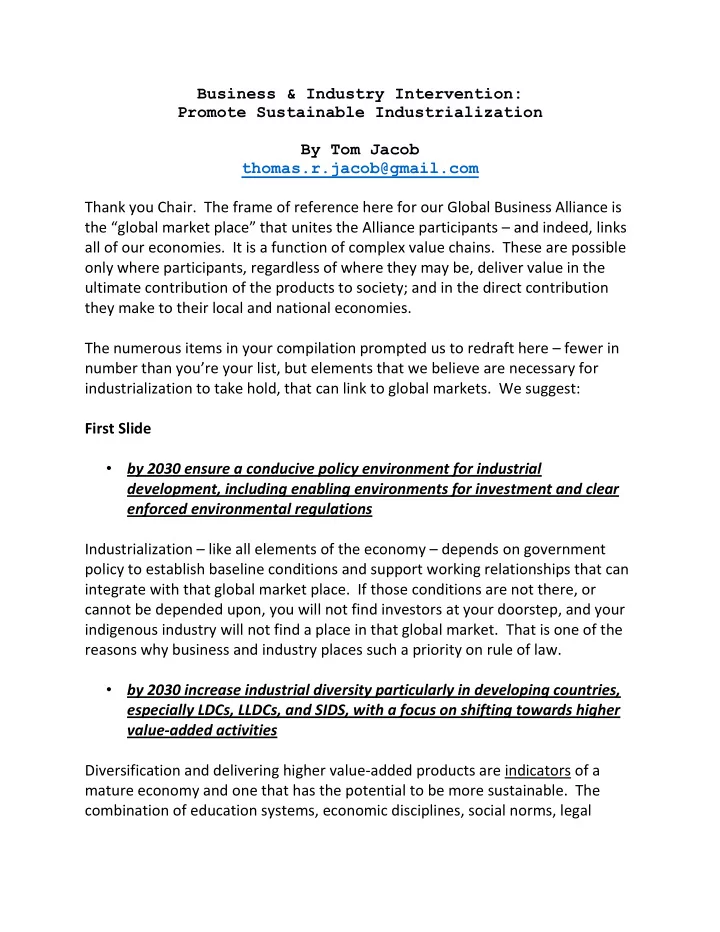

Business & Industry Intervention: Promote Sustainable Industrialization By Tom Jacob thomas.r.jacob@gmail.com Thank you Chair. The frame of reference here for our Global Business Alliance is the “global market place” that unites the Alliance participants – and indeed, links all of our economies. It is a function of complex value chains. These are possible only where participants, regardless of where they may be, deliver value in the ultimate contribution of the products to society; and in the direct contribution they make to their local and national economies. The numerous items in your compilation prompted us to redraft here – fewer in number than you’re your list, but elements that we believe are necessary for industrialization to take hold, that can link to global markets. We suggest: First Slide • by 2030 ensure a conducive policy environment for industrial development, including enabling environments for investment and clear enforced environmental regulations Industrialization – like all elements of the economy – depends on government policy to establish baseline conditions and support working relationships that can integrate with that global market place. If those conditions are not there, or cannot be depended upon, you will not find investors at your doorstep, and your indigenous industry will not find a place in that global market. That is one of the reasons why business and industry places such a priority on rule of law. • by 2030 increase industrial diversity particularly in developing countries, especially LDCs, LLDCs, and SIDS, with a focus on shifting towards higher value-added activities Diversification and delivering higher value-added products are indicators of a mature economy and one that has the potential to be more sustainable. The combination of education systems, economic disciplines, social norms, legal
structures and the like – essentially all the elements you are seeing come together in these SDGs - all contribute to enabling industries to realize their full potential. • by 2030 full implementation of UN trade and transport facilitation tools such as the TIR Convention and the Harmonization Convention To enable local industry to effectively capitalize on the global market place, an important policy contribution of governments must be to adopt and enforce a number of policy instruments that are very fundamental “enablers” of basic market relationships across jurisdictions. These include the Convention on the International Transport of Goods, and the Convention on the Harmonization of Frontier Controls of Goods. They are essential – again, examples of why we place such priority on rule of law. Second Slide • by 2030 increase investment in and maintain basic and ancillary infrastructure including road and rail; electricity generation and supply, including renewable energy; information and communication technologies; water and wastewater services; and the recovery of resources and used materials These are all vitally important to the global market place. Whether the industry involved is the product of direct investment or a supplier in a value chain, it depends upon consistency and predictability in both cost and timing of goods, and these are vitally dependent upon these basic elements of infrastructure. These are vital “enabling conditions” for industrialization. • by 2020 implement national plans and measures systematically encourage the strengthening of the technological capabilities of industrial sectors, including plans to accelerate development, dissemination and adoption of environmentally sound industrial technologies, processes and management systems, maintaining strong intellectual property rights protection These are also enabling conditions. Governments can enhance the ability of their industry to engage in the global market place by planning for industrial land use
and through policies and partnerships that encourage development, adoption or the importing of industry programs enhancing the ability of their industry to adapt and deliver sustainable value. Third Slide • by 2030 develop sustainable infrastructure accessible to all, with attention to needs of countries in special situations, and provide access for x% of rural populations to basic infrastructure and services These are enablers yielding maximum value from any country’s resource and agricultural sectors, and therefore enable industrialization to yield value in the global market place. Importantly, that value also comes from enabling the populations in benefiting areas and communities to contribute more fully to the richness of their economy. • by 2030, expand access by x% to safe, affordable, accessible and sustainable transport This, too, is becoming a more and more important dimension of infrastructure to enable any development – including more sustainable industrialization – to better adapt to our challenging World, and to yield sustainable value.
Recommend
More recommend